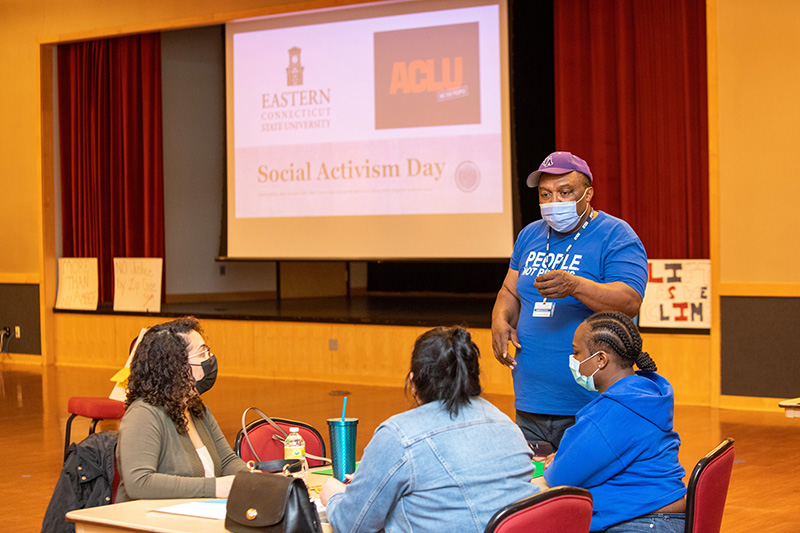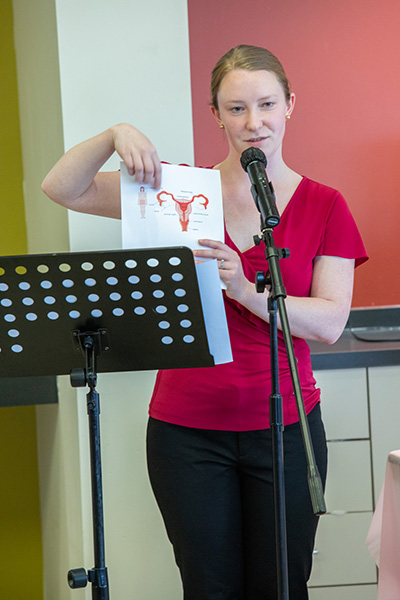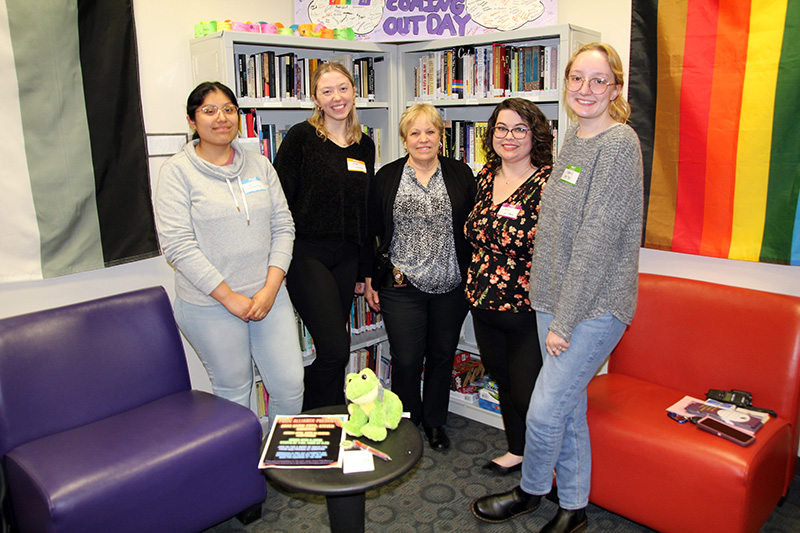- Apply
- Visit
- Request Info
- Give



Published on April 20, 2022

Through service and outreach, Eastern social work students are immersing themselves in the community and gaining field experience. For a required course of the Social Work major -- "Generalist practice with communities and organizations" (SWK 300) -- junior-level students complete 45 hours of work with a community organization, often hosting an event for a specific social issue.
Eastern’s Social Work program consists of approximately 80 junior-and senior-level students. This semester, 12 cohorts of three-four students spearheaded community projects for SWK 300. Students chose causes they feel passionate about and worked closely with a group leader from that organization. Both on and off campus, partnering organizations included Eastern’s Unity Wing centers, GROW Windham, Windham PRIDE, American Civil Liberties Union (ACLU) of Connecticut and more.

A key part of social work education is field experience, said Professor of Social Work Sarah Nightingale. “In this project students are able to take what they are learning in the classroom and apply it in the real work, all while helping local organizations.”
Sidney Petro ’23 worked with group members to complete a project for Eastern’s Women’s Center, with the center's director Starsheemar Byrum. Focusing on the issue of "period poverty," the group aimed to make menstruation services and information more accessible and less stigmatized. “Our goal was to let people know that this topic shouldn't be uncomfortable, and the Women's Center is always here to help you if you’re in need of assistance,” said Petro.
Petro went on to explain how planning the event and working with the Women’s Center taught the group a variety of lessons. “This project has advanced the group’s social work education by providing us with awareness on how we speak, how important pronouns are, and how to address a wide variety of people without coming on too strong. We realized that the Women's Center is not just for women. Although this organization’s main goal is to assist women with their needs, they also have a collective group of people who identify in many ways.”
Like many other groups, the Women’s Center team found promoting their event to be a consistent struggle. “Encouraging students on campus to be open about such a sensitive subject is hard, yet very possible,” said Petro.
Working with the ACLU of Connecticut, Tamarin Kelley ’23 and her group, led by senior policy organizer for the ACLU Anderson Curtis, found that organization on a policy level was all about connections. “Our leader [Curtis] knew everyone. He’s never afraid to approach someone to talk about an issue he’s passionate about, which was really inspiring to watch.”
The ACLU group spent their semester learning about different policies that impacted people living with criminal records, including the Collateral Consequences bill, which would ensure protection against discrimination in the workforce for those living with a record.
“It’s important for people to be presented with equal opportunity, and the Collateral Consequences bill allows for that to be possible,” said Kelley. She and her group hosted an event on campus in Eastern’s Betty Tipton Room, where students could come and learn about the bill, talk to Curtis and participate in related activities. “It was amazing to see people come together and learn about this new piece of legislation. Seeing our group in action, finally meeting a goal we had set all semester in planning this event was an amazing learning experience.”

Allison Dumphy ’23 and their group worked with Eastern’s Pride Center coordinator Nicole Potestivo, aiming to bring awareness to the resources available at the center, as well as to the issue of online dating with a presentation by Eastern Police Sergeant Lisa Hamilton.
“Safety while dating online is more important than ever in our digital age with applications and technology evolving rapidly,” said Dumphy. “Part of our focus is on inclusivity within these apps and websites when it comes to LGBT+ safety as people within the LGBT+ community are more likely to witness harassment, emotional or physical violence than their heterosexual counterparts.”
Like many other social work students, Dumphy and their group found one of the biggest hurdles of the project to be policy and bureaucratic roadblocks. “There are many steps to each action that we want to take, such as fliers being approved for posting and filling out a form to be able to request services from Chartwells to provide refreshments. Having a strong mentor to help guide us through that has been indispensable.”
When it comes to community organizing, Dumphy says that teamwork and cooperation with peers is key. “When it comes to community change, your team is the backbone of the entire operation and it needs to be strong... to keep your goals in mind and at the forefront of what you do, and to demonstrate and provide strength for the community you serve to help build them up.”
Written by Molly Boucher